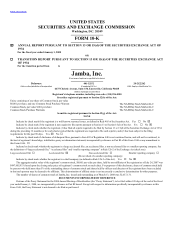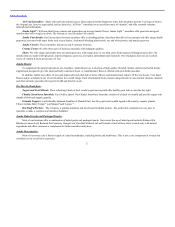Jamba Juice 2008 Annual Report Download - page 11
Download and view the complete annual report
Please find page 11 of the 2008 Jamba Juice annual report below. You can navigate through the pages in the report by either clicking on the pages listed below, or by using the keyword search tool below to find specific information within the annual report.
Table of Contents
large degree on the quality of the basic fruit ingredients from which it is made. It is therefore essential that the supply of fruit is of the highest quality and is
consistent throughout the year. To achieve these dual goals we purchase our projected requirements for the coming year of a given type of fruit from suppliers
at the height of the season for that particular fruit. The supply and price of fresh and fresh frozen-fruit are dependent upon the supply and demand at the time
of purchase and are subject to significant volatility. Supply and price can be affected by multiple factors in the producing regions, including weather, natural
disasters and regional political and economic conditions. In addition, as we continue to grow, we will likely become more dependent upon global fruit supplies
than we have in the past, which may result in natural disasters and global political and economic conditions having a greater effect on the supply and price of
our fruit ingredients and our profitability.
We use only the highest quality fruit in our products. We conduct quality assurance testing at the time of packing to ensure that the fruit meets our high
standards, which meet or exceed USDA Grade-A standards. The fruit is then flash-frozen and stored by the supplier(s) for shipment to distributors
throughout the year. We contract with independent distribution companies to distribute products to the stores. The length of these contracts varies in duration.
Given the density of stores in California, the costs of goods sold in California is lower than other regions of the country. We believe that by clustering future
store development we can begin to lower distribution costs, and therefore reduce cost of goods sold, in non-California markets.
Southwest Traders, Inc. is a distributor of proprietary products to our Company Stores and Franchise Stores. Southwest Traders distributed
ingredients that made up approximately 81% of cost of sales for Jamba Juice Company’s fiscal 2007. Southwest Traders does not manufacture or negotiate
pricing agreements for products sold in our stores. They serve solely in a warehousing and distribution capacity and receive a fixed mark up per case on the
independently negotiated cost of our ingredients. Our contract does provide that during the term we will use Southwest Traders as our exclusive distributor
within certain territorial boundaries provided they meet required service levels. The contract is firm through December 31, 2012 and is not subject to
cancellation unless either party defaults within the contract due to non-performance.
All of our nutritional supplements (i.e., Boosts), pretzels and baked goods are produced to very exacting specifications. All products are shipped
directly to stores using outside distributors. We do not maintain central warehousing facilities.
The beverage industry is highly competitive and fragmented. Restaurants compete based on a number of factors, including quality, price-value
relationships, customer service, name recognition, employee hiring and retention and location. We compete with a variety of purveyors of quick, convenient
food and beverage products, including quick service restaurants, coffee shops, donut shops and grocery stores. While competition in the beverage market is
fragmented, competition is increasing, and a major competitor with substantially greater resources than the Company could enter the market at any time and
compete directly against Jamba Juice Company.
We compete most directly with regional smoothie stores, most of which are franchises of other smoothie brands. Additionally, the rising popularity of
convenient and healthy food items may result in increased competition from traditionally non-smoothie retailers as they increase their offerings of smoothies
and other juice-related products.
In addition, we also face intense competition from both restaurants and other specialty retailers for suitable sites for new stores and qualified personnel to
operate both new and existing stores. There can be no assurance that the Company will be able to continue to secure adequate sites at acceptable rent levels or
that the Company will be able to attract a sufficient number of qualified personnel.
11
























